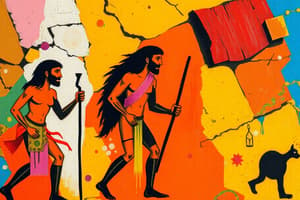Podcast
Questions and Answers
What is the time period of the Paleolithic era?
What is the time period of the Paleolithic era?
- 5,000 - 2,000 BCE
- 10,000 - 5,000 BCE
- 1,000 - 500 BCE
- 2.5 million - 10,000 BCE (correct)
Which ancient civilization is known for its pyramids and pharaohs?
Which ancient civilization is known for its pyramids and pharaohs?
- Ancient Rome
- Ancient Egypt (correct)
- Mesopotamia
- Ancient Greece
What is the time period of the Medieval History?
What is the time period of the Medieval History?
- 15th - 20th centuries
- 10th - 15th centuries
- 5th - 10th centuries
- 5th - 15th centuries (correct)
What is the main characteristic of the Neolithic era?
What is the main characteristic of the Neolithic era?
Which period is known for the Industrial Revolution?
Which period is known for the Industrial Revolution?
What is the time period of the Early Modern History?
What is the time period of the Early Modern History?
Which ancient civilization is known for its city-states?
Which ancient civilization is known for its city-states?
What is the main characteristic of the Mesolithic era?
What is the main characteristic of the Mesolithic era?
Flashcards are hidden until you start studying
Study Notes
Prehistory
- The study of prehistory spans from the emergence of humans to the development of writing systems
- Divided into three periods:
- Paleolithic (Old Stone Age): 2.5 million - 10,000 BCE, characterized by nomadic hunter-gatherers and primitive tools
- Mesolithic (Middle Stone Age): 10,000 - 5,000 BCE, saw the development of more sophisticated tools and early agriculture
- Neolithic (New Stone Age): 5,000 - 2,000 BCE, marked by the rise of settled agriculture and the emergence of cities
Ancient History
- Ancient civilizations flourished in Mesopotamia, Egypt, Greece, and Rome
- Key events and empires:
- Mesopotamia: Sumerians, Babylonians, and Assyrians
- Ancient Egypt: Pyramids, Pharaohs, and the Ptolemaic Kingdom
- Ancient Greece: City-states (Athens and Sparta), Golden Age, and the Hellenistic period
- Ancient Rome: Roman Republic, Roman Empire, and the Pax Romana
Medieval History
- Period of time from the fall of the Roman Empire to the Renaissance (5th - 15th centuries)
- Key events and developments:
- The rise of Christianity and the Catholic Church
- The fall of the Western Roman Empire and the emergence of feudalism
- The Crusades and the Black Death
- The growth of trade and cities during the High Middle Ages
Early Modern History
- Period of time from the Renaissance to the French Revolution (15th - 18th centuries)
- Key events and developments:
- The Renaissance and the Enlightenment
- The Age of Exploration and the discovery of the New World
- The Protestant Reformation and the Thirty Years' War
- The rise of nation-states and absolute monarchies
Modern History
- Period of time from the French Revolution to the present day (18th - 21st centuries)
- Key events and developments:
- The Industrial Revolution and the growth of capitalism
- The World Wars and the Cold War
- The rise of nationalism and independence movements
- Globalization and the digital age
Prehistory
- Spans from the emergence of humans to the development of writing systems
- Divided into three periods: Paleolithic, Mesolithic, and Neolithic
- Paleolithic (2.5 million - 10,000 BCE): characterized by nomadic hunter-gatherers and primitive tools
- Mesolithic (10,000 - 5,000 BCE): development of more sophisticated tools and early agriculture
- Neolithic (5,000 - 2,000 BCE): rise of settled agriculture and the emergence of cities
Ancient History
- Ancient civilizations flourished in Mesopotamia, Egypt, Greece, and Rome
- Mesopotamia: Sumerians, Babylonians, and Assyrians
- Ancient Egypt: construction of pyramids, reign of pharaohs, and the Ptolemaic Kingdom
- Ancient Greece: city-states of Athens and Sparta, Golden Age, and the Hellenistic period
- Ancient Rome: Roman Republic, Roman Empire, and the Pax Romana
Medieval History
- Period of time from the fall of the Roman Empire to the Renaissance (5th - 15th centuries)
- Rise of Christianity and the Catholic Church
- Fall of the Western Roman Empire and the emergence of feudalism
- Crusades and the devastating effects of the Black Death
- Growth of trade and cities during the High Middle Ages
Early Modern History
- Period of time from the Renaissance to the French Revolution (15th - 18th centuries)
- Renaissance: revival of classical culture and art
- Enlightenment: emphasis on reason, individualism, and democracy
- Age of Exploration: discovery of the New World and establishment of trade routes
- Protestant Reformation: led to the Thirty Years' War and the decline of Catholic Church
- Rise of nation-states and absolute monarchies
Modern History
- Period of time from the French Revolution to the present day (18th - 21st centuries)
- Industrial Revolution: transition from manual labor to machine-based manufacturing
- World Wars: global conflicts that led to significant political and economic changes
- Cold War: ideological conflict between the US and USSR
- Rise of nationalism and independence movements in colonized countries
- Globalization: increased interconnectedness and interdependence of economies
- Digital age: rapid advancement in technology and communication
Studying That Suits You
Use AI to generate personalized quizzes and flashcards to suit your learning preferences.




